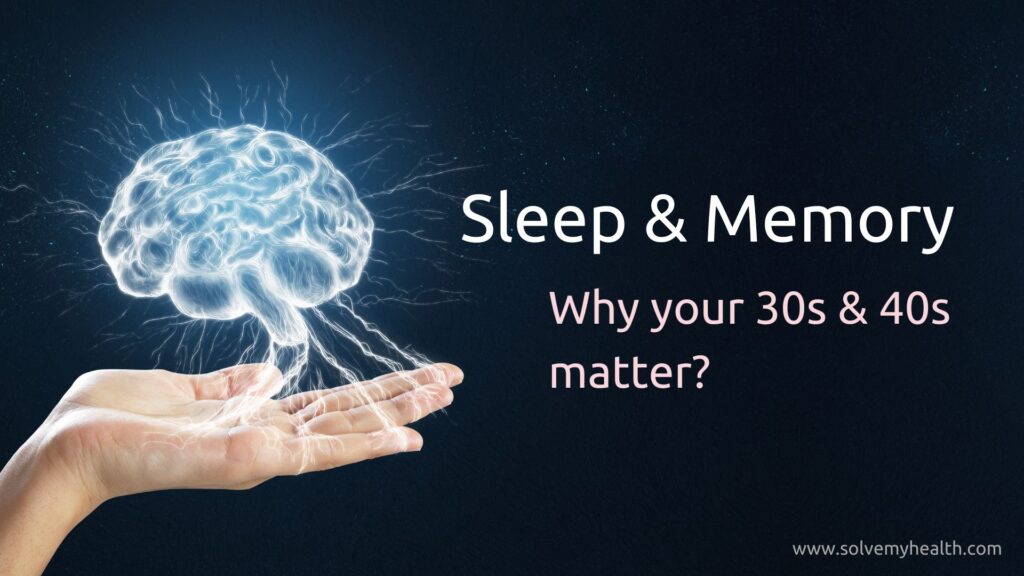Sleep is not just about resting your body; it’s also essential for keeping your brain healthy and sharp. When you sleep, your brain processes everything you’ve learned and experienced during the day. This process helps you store memories and improves your ability to learn and solve problems. If you don’t get enough sleep, your brain doesn’t have the time to do its job properly, which can lead to forgetfulness, slower thinking, and difficulty concentrating.
As you enter your 30s and 40s, sleep becomes even more important. At this stage of life, many people experience increased responsibilities—like work, family, and personal health—which can make it harder to get good-quality sleep. However, making sleep a priority can improve not only how you feel but also how well your brain works. Understanding the connection between sleep and memory is key to maintaining good cognitive function as you age.
Sleep Patterns of Age 30 and 40
As you enter your 30s, you might notice that sleep doesn’t come as easily as it once did. Many people in their 30s struggle with getting enough sleep due to an increase in responsibilities. Whether it’s career pressures, raising children, or managing a household, life gets busier, leaving less time for quality rest. Sleep is often disrupted by stress, late-night work, or irregular schedules, and this can result in shorter and more restless sleep. Even though adults still need around 7-9 hours of sleep a night, people in their 30s frequently get less, which can lead to feeling tired and mentally foggy during the day.
Hormonal changes also start to play a role in sleep quality during this decade. In your 30s, the body begins to produce less melatonin, the hormone that regulates sleep and helps you feel drowsy at bedtime. As melatonin levels drop, it can become harder to fall asleep or stay asleep. Additionally, stress hormones like cortisol may remain elevated longer due to work and lifestyle pressures, making it harder to unwind and get restful sleep. Over time, sleep loss starts to build up, affecting not only how you feel during the day but also your cognitive functions, including memory and decision-making.
By the time you reach your 40s, sleep issues tend to become more noticeable. Many people in their 40s experience a natural shift in their sleep cycle, often referred to as “sleep fragmentation.” This means your sleep becomes lighter and more easily disturbed. You may find yourself waking up multiple times during the night, even without realising it, which leads to poor sleep quality. This stage of life is also when some individuals start to develop sleep disorders, like insomnia or sleep apnea, which further disrupt sleep patterns and leave you feeling tired in the morning.
In addition to hormonal and lifestyle factors, ageing itself can impact how well you sleep. As people get older, the body spends less time in the deep stages of sleep (known as slow-wave sleep), which is essential for feeling rested and allowing the brain to recover. However, sleep can be impaired for a variety of medical and lifestyle reasons beyond just ageing and hormonal changes. Stress is one of the most common factors, as ongoing anxiety from work, relationships, or financial concerns can make it difficult to relax and fall asleep.
Poor sleep hygiene, such as inconsistent bedtimes, excessive screen time, or using electronic devices before bed, can also disrupt your body’s natural sleep-wake cycle. Certain medical conditions like sleep apnea, restless leg syndrome, chronic pain, and heartburn can make it hard to stay asleep through the night. Additionally, lifestyle habits such as consuming caffeine or alcohol too close to bedtime can interfere with sleep quality. A lack of physical activity during the day can also contribute to restlessness at night, as exercise helps regulate sleep patterns. Finally, conditions like depression or anxiety, and even some medications used to treat them, can lead to insomnia or poor sleep quality.
Reduced deep sleep can leave you feeling mentally sluggish and can negatively affect your memory, concentration, and overall brain health. Prioritising sleep in 30s and 40s is extremely important to mitigate these issues and support better cognitive function as you age.
How many hours of sleep do you need?
The number of hours of sleep a person requires varies based on their age and activity levels. Generally, younger individuals need more sleep because their bodies and brains are still developing, and requires more restorative processes during sleep. For example, infants may require up to 16 hours of sleep daily to support rapid growth and brain development, while teenagers need around 8 – 10 hours to balance the demands of hormonal changes, learning, and physical activity. In contrast, adults typically need 7-9 hours of sleep for optimal functioning, as their growth phase is complete, though sleep is still essential for maintaining health and cognitive performance.
Activity levels also influence sleep requirements; highly active individuals, such as athletes, may need additional sleep to recover and repair their muscles and replenish energy stores.
| Age | Recommended hours of Sleep |
| Upto 1 year | 12 – 16 hours |
| 1 – 2 yrs | 11 – 14 hours |
| 3 – 5 yrs | 10 – 13 hours |
| 6 – 12 yrs | 9 – 12 hours |
| 13 – 18 yrs | 8 – 10 hours |
| 18 yrs + | 7 hours or more |
Impact of Sleep on Memory
Sleep plays a crucial role in memory consolidation – the process of turning new information into lasting memories. When you sleep, especially during the deep sleep and REM (Rapid Eye Movement) stages, your brain processes and organises everything you have learned during the day. This helps move information from short-term memory to long-term storage, making it easier to recall later. If you don’t get enough sleep, or if your sleep is frequently interrupted, your brain doesn’t have enough time to complete this process, which can make it harder to remember things and affect your ability to learn new information.
Also Read: What happens when we sleep?
Poor sleep can also impair your working memory, which is responsible for holding and using information in the short term, like remembering a phone number or following a conversation. Without enough quality sleep, your attention, focus, and decision-making abilities can also suffer. Over time, chronic sleep deprivation can increase the risk of cognitive decline, including conditions like Alzheimer’s disease, as the brain struggles to clear out harmful proteins such as Beta-amyloid and Tau, that build up during waking hours. This makes getting regular, uninterrupted sleep essential for both short-term mental sharpness and long-term brain health.
Tips to Improve Sleep Quality
The first step towards improving sleep quality is creating a consistent sleep schedule. Going to bed and waking up at the same time every day helps regulate your body’s internal clock, known as the circadian rhythm. This makes it easier to fall asleep and wake up naturally. Limiting exposure to bright screens, like phones or computers, at least an hour before bedtime can also help, as the blue light from these devices interferes with the production of melatonin, the hormone that makes you feel sleepy. Instead, try relaxing activities like reading or listening to calming music to signal to your brain that it’s time to wind down.
Another important factor is creating a sleep-friendly environment. Your bedroom should be cool, dark, and quiet to promote better sleep. Consider using blackout curtains to block light and earplugs or white noise machines to reduce noise disruptions. Investing in a comfortable mattress and pillows can also make a significant difference. Avoid caffeine or alcohol in the hours leading up to bedtime, as both substances can interfere with deep sleep. Regular physical activity during the day can improve sleep quality as well, but it’s important not to exercise too close to bedtime, as this can have the opposite effect.
For people struggling with persistent sleep issues, natural supplements like melatonin and magnesium glycinate can be helpful. Melatonin supplements can support the body’s natural sleep-wake cycle, particularly for those who struggle to fall asleep. Magnesium glycinate, on the other hand, helps relax muscles and reduce stress, making it easier to enter a state of calm before bed. However, these supplements work best when combined with good sleep habits.
Learn more about: Magnesium Glycinate
How SOLVE Products Can Help: Melatonin Spray & Magnesium Glycinate
SOLVEMyHealth’s Melatonin Spray and Magnesium Glycinate are designed to address the challenges to sleep, by supporting natural sleep processes.
The Melatonin Spray is a better alternative to tablets; it is absorbed sublingually, meaning it’s sprayed under the tongue, where it enters the bloodstream directly, bypassing the digestive system. This allows for quicker absorption into the bloodstream through the mucous membranes located under the tongue, thereby facilitating faster onset of sleep at lesser dosages. Such an absorption process is more efficient compared to tablets, as tablets may lose potency during digestion and also take longer to produce effects.
Melatonin Oral Spray 30Ml
Melatonin Oral Spray Natural Sleep Aid is crafted to restore balance to your sleep cycle, providing a gentle and effective aid for restful nights. Our specialized formula includes: Melatonin to support your body’s natural sleep-wake rhythm, helping you fall asleep faster and wake up refreshed Fast-Acting Spray for quick absorption and easy use, especially on busy or stressful nights Ideal Dosage designed to help reduce sleep disturbances caused by lifestyle factors like stress, irregular schedules, and exposure to artificial light Non-Habit Forming ingredients to promote healthy sleep patterns without dependency
Magnesium is yet another component that is crucial for calming the nervous system, reducing cortisol (the stress hormone), and relaxing muscles, all of which contribute to better sleep quality. SOLVEMyHealth’s Magnesium Glycinate offers benefits over other magnesium forms such as oxide or citrate due to its superior absorption and gentler effect on the stomach. The glycine component of magnesium glycinate also adds to its relaxing properties, making it more effective in promoting relaxation without causing digestive issues that can arise with other forms of magnesium.
Magnesium Glycinate
SOLVE Magnesium Glycinate is specially formulated to supporting both physical relaxation and mental well-being. Our carefully crafted blend includes: Highly Bioavailable Magnesium for optimal absorption and minimal digestive discomfort Glycine to promote calmness and support restful, rejuvenating sleep Muscle and Nerve Support to maintain healthy muscle function and a balanced nervous system Clinically Researched Ingredients known to enhance relaxation, sleep quality, blood pressure and overall stress management
Both products are subject to strict quality control standards. Each is tested to ensure they are free from harmful contaminants, such as heavy metals and toxins. At SOLVE, we ensure that only scientifically researched ingredients are used, with rigorous testing to ensure safety and effectiveness for long-term use without unwanted side effects.












